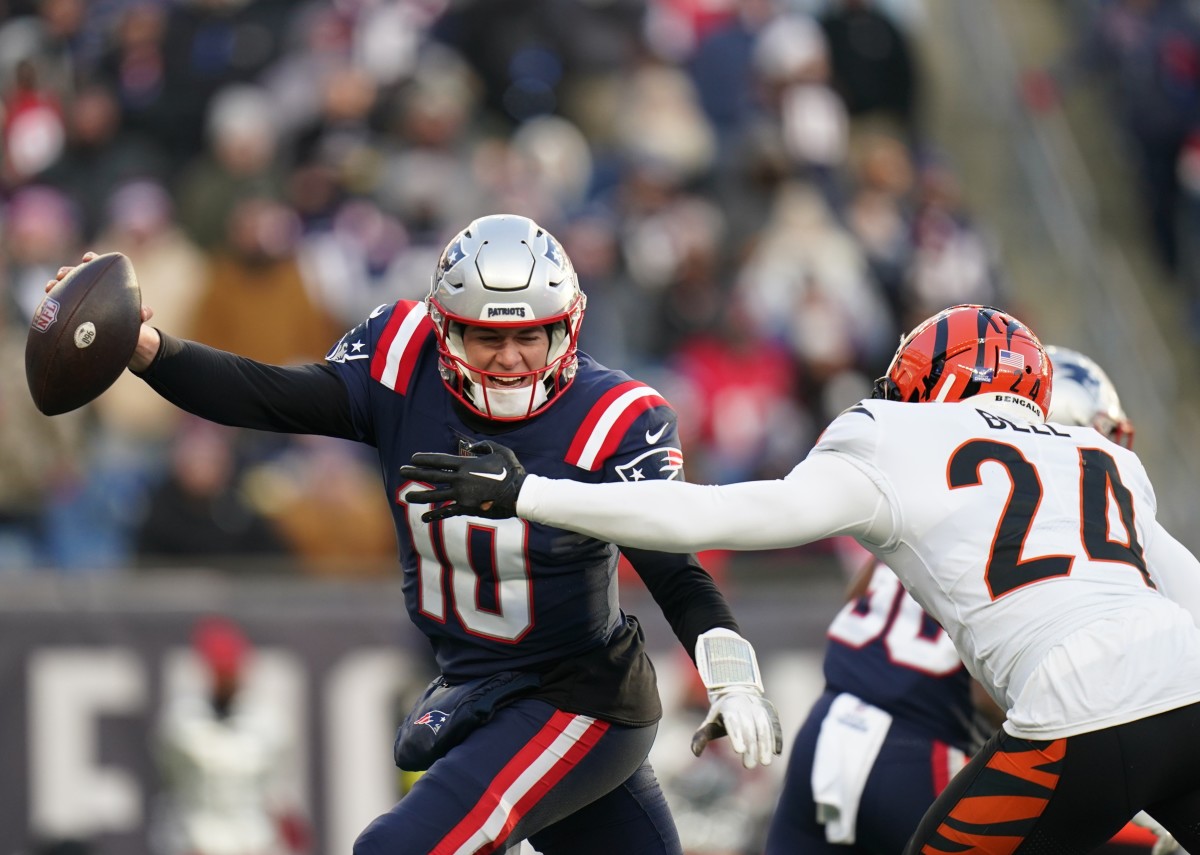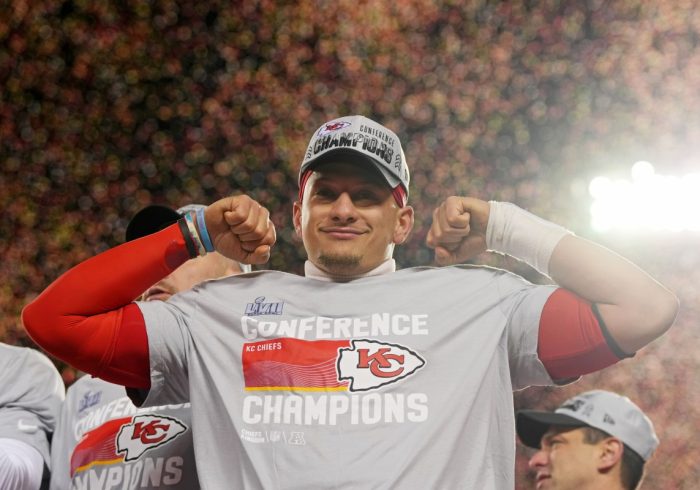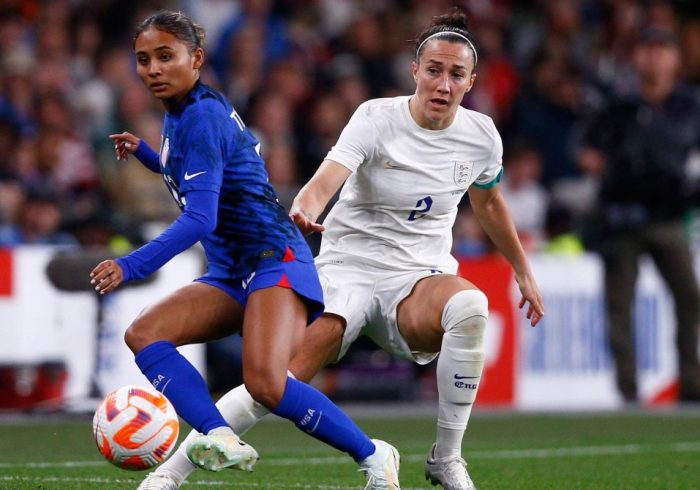More MMQB: Cowboys Beat Eagles Thanks to Lessons From Loss to Jaguars | Ten Takeaways: Kenny Pickett on the Good and Bad of His Rookie Season | Six From Saturday: Ranking the Six Best 2023 NFL Prospects in the College Football Playoff
There was a point in the Bengals-Patriots game Saturday where the whole thing had taken on the look of Alabama beating down The Citadel the week before the Iron Bowl.
Here’s a snapshot of where the teams stood after the Bengals scored their final points of the first half on a four-yard touchdown pass from Joe Burrow to Trenton Irwin to take a 22–0 lead:
• The Bengals had 303 yards; the Patriots had 60.
• The Bengals had run 48 plays; the Patriots had 15.
• The Bengals had 22 first downs; the Patriots had two.
• All five of the Bengals’ possessions had made it into the red zone. The Patriots’ offense hadn’t crossed midfield (and wouldn’t until the final play of the third quarter).
Bell had six tackles against the Patriots. But his biggest play of the day was punching the ball free from Rhamondre Stevenson when the Patriots were on the verge of rallying from a 22-0 deficit.
David Butler II/USA TODAY Sports
It easily, absent an interception, a holding call that nullified a touchdown and two missed extra points, could’ve been, and probably should’ve been, 35–0. Even so, the thought of the game slipping away against a team Cincinnati had so thoroughly outclassed well into the third quarter seemed, well, ridiculous.
That it almost did should provide the defending AFC champs with a valuable lesson.
Yes, the Bengals left happy—pulling their 11th win out of that fire—but it happened in a very different way than anyone thought it would around 3 p.m. ET, with the still-growing Bengals making a play when every break was going against them.
“You can take it two ways,” safety Vonn Bell told me Saturday, as he was leaving the locker room in Foxborough. “Like, yeah, we want to finish, keep a goose egg, have a strong win that way. But adversity happens. And in this league, it’s always tough, winning December football in a hostile environment, weather conditions, everything. Just finding a way to win, that’s how you become a championship team—that’s the biggest thing. We finished in that regard.”
Bell, specifically, finished in that regard.
But the truth is, like he said, he probably shouldn’t have had to.
The trouble started with 19 minutes left and the score still 22–0. A third-and-1 conversion to get the Bengals inside the Patriots’ 30, again was negated by a holding call, and a miscommunication between Burrow and Ja’Marr Chase sent a Burrow throw into the arms of New England’s most explosive player, Marcus Jones, who returned the interception 69 yards for a touchdown.
On New England’s next possession, the offense came alive, with Mac Jones guiding an 11-play, 77-yard touchdown drive to cut the deficit to 22–12. After that, a Hail Mary type of throw on a third-and-29 from midfield ricocheted into the waiting hands of Jakobi Meyers to get the Patriots to within 22–18 (Nick Folk matched Evan McPherson with two missed PATs). And then a Chase fumble, the fourth of his career, put the Patriots in position at the Cincinnati 43 with 3:12 left to drain the clock and win the game.
“You felt the momentum shift when they were making those plays on the ball,” Bell says. “But you just can’t bat an eye. Gotta go out there and be a problem solver and just make plays and really just put the onus on yourself—How can I do better this drive? What can I do play by play? And what can I do to bring a spark to the team? So it was like, just do your job, and we’ll go out there and chip away.”
Bell made the dam break for the home team on first-and-goal with 1:05 left, with the Patriots at the Cincinnati 5. And there are two things that led to his game-saving forced fumble.
The first is in an inside-run drill the Bengals practice with their defensive players, where they put bags down on the field and have the back try to run between the bags, with two defenders fitting the run. The first defender form-tackles the back, and the second defender goes after the ball—it’s pretty standard for training camp, and Cincinnati makes a point to keep doing it in season. So Bell’s been working on his punch (and, with his instincts, he’s pretty good with it anyway).
The second thing was the personnel grouping. Expecting the Patriots would run the ball to bleed the clock on first down, defensive coordinator Lou Anarumo put a third defensive tackle into the game, sending 340-pound Josh Tupou in to play next to D.J. Reader and B.J. Hill, and sending Bell on a run blitz off the edge. That Tupou was in there to help tie up blockers gave Reader a better shot to pop free, which he did on the play—stone-walling Rhamondre Stevenson and leaving the second man, Bell, to punch the ball free.
“And it came out,” Bell says, laughing. “It was just making plays for the team, laying it all out, and going out there and having fun with the guys.”
Hill wound up falling on it, more or less finishing the Patriots, capping the story for Bell and cementing a good lesson for everyone.
“Things happen,” Bell says. “They got a pick-six, a fumble, they got the little Hail Mary pass. Things happen. They get paid, too. We just wanted to finish. We want to play a perfect game. But adversity happens, and you gotta know how to respond. So that’s why I said that’s what makes it so great for this team, to find out a way to win in times of unconventional things that are happening in the game, in the moment.
“It’s learning how to finish. That’s what it’s gonna take coming down the stretch.”
The Bengals finished with 442 yards to the Patriots’ 285, and 28 first downs to the Patriots’ 15—Cincinnati happily took the win, and the lesson.
Next up? The Bills, in Week 17, at home Monday night, in a game that will go a long way in determining how the top seeds in the AFC bracket will shake out. In talking about that one, Bell told me that he sees his team as “one of the tops in the league, for sure. But we gotta go out there and prove it week in and week out.”
Bell and his teammates know it’ll take a much cleaner effort to beat the Bills. And maybe a few plays such as the one he made to bail the Bengals out of a mess against the Patriots.
Foreman ran through the Lions for 165 yards on 21 carries and a touchdown.
Bob Donnan/USA TODAY Sports
The aftermath of getting routed at home Oct. 9 was ugly, for sure, for the Panthers. That 37–15 loss to the 49ers didn’t just drop Carolina to 1–4, it led to the firing of third-year coach Matt Rhule and an avalanche of rumors that the Panthers would trade everyone from Christian McCaffrey (that was true) to Brian Burns (that wasn’t).
Even then, record-wise, the bottoming out hadn’t hit its low point. That came a month later, at the hands of the Bengals, who went up 35–0 at the half on the listless Panthers and cruised to a 42–21 win.
The thought that the players would stay engaged at that point—particularly with an interim coach who was trying to sell the team on the idea of becoming a dominant, physical, run-heavy group, and do it without McCaffrey—seemed laughable. But Steve Wilks believed his players would get there, and the players believed it, too, and that, it turns out, was enough, as the rest of us were projecting the Panthers’ draft position for April.
That belief Wilks instilled in the Panthers manifested Sunday in a very big way. With a franchise-record 320 yards rushing, and a franchise-record 570 total yards from scrimmage. With the Panthers’ fourth win in six games, and their third in four games. And with the team now somehow positioned to control its own destiny—with wins in Tampa and New Orleans the next two weeks, the Panthers will win the NFC South.
“I think it’s just the mindset that he instills in us everyday,” tailback D’Onta Foreman told me after rushing for 165 yards and a touchdown on 21 carries. “Just from the time he took over, it was the mindset of winning up front, being physical up front, dominating up front and then just letting the backs do what we need to do. Not just on offense, but on the defensive side of the ball, too. Those guys played really good today, stopping the run.
“That’s just the mindset that he came in with, and that’s how he talks and that’s how he coaches each and every day—being physical, making sure your eyes are in the right place, hands, hips, feet, all the things that he tells us. I just think it’s the mindset .”
As Foreman explained that, I said to him that it sounded like Wilks was almost taking the team back to training camp. He agreed and mentioned that, while the coaches aren’t running practices like they would in the summer, the pads have been on during the week, and that’s helped the Panthers “just stay on track, stay focused and just keep getting the right fits. It’s been paying off for us.”
It paid off with 232 yards rushing the week after the Bengals game in a 10-point win over the Falcons. It paid off with 185 yards rushing in a 13-point win over Denver and 223 yards rushing in a 30–24 win over the Seahawks. And by the time Wilks’s crew got to Sunday’s game against the surging Lions, it was like clockwork—the Panthers run it, the Panthers win.
It didn’t take long to see Saturday that Carolina would be able to run it on Detroit. Chuba Hubbard, the Panthers’ other 100-yard rusher Sunday, went for 30 off left end on the game’s first play from scrimmage, then for 35 up the gut on the Panthers’ second snap, and it was on.
What’s more, the Panthers actually saw this coming.
“Through the course of the week, watching film, seeing how those guys play, we knew they were gonna be physical coming downhill,” Foreman says. “So it was just about being patient, finding the right holes, making the right reads and just making them commit. And I feel like we did a great job of doing that, making those guys choose the wrong holes. The line got up to them and covered those guys up—and that made it pretty easy for us to do what we needed to do.”
The game-opening five-play, 78-yard touchdown drive consisted of five runs. An eight-play, 91-yard drive to start the second quarter included five runs (two of them designed runs for Sam Darnold) and three throws. And the run-pass ratio on Carolina’s third touchdown drive that covered 92 yards over 11 plays was 8–3.
At the half, it was 24–7, and the Panthers already had 240 yards on 22 carries, taking a Detroit team that prides itself on its toughness, so much so that Lions coach Dan Campbell was caught on camera saying to Wilks on his way off the field, “That was an absolute ass-kicking. That’s a f—ing great job.”
In the second half, the effects of the run game took hold. On the Panthers’ first possession of the third quarter, Darnold went up top for 47 yards off play-action to D.J. Moore, then hit him for a five-yard score on the next play. And how much better the Panthers have gotten was coming into focus.
It remains to be seen whether Wilks will get to build on all of this in 2023. But it’s pretty clear to the players the difference he’s made, and the look of the team should make it easy for everyone else to see, too.
“His intensity, the way he leads, the way he conducts the meetings and everything, you can just tell the difference in the vibe and the energy that we have and that he brings,” Foreman says. “It’s definitely contagious. So it’s just spreading around the team, and everybody’s really believing and starting to buy into the things that he’s saying. I just want to keep going, keep winning for him, this team, and do what we can do to make a run.”
They already have made a run. As for whether Wilks should be the coach after this season, Foreman was clear.
“Of course,” he says. “Definitely.”
Edwards averaged nine yards per carry against the Falcons, rushing for 99 yards.
Tommy Gilligan/USA TODAY Sports
Remember the Ravens? In three weeks you’ll see them back in the playoffs.
And there’s a decent chance that by the time we get there, Baltimore will start to look like the sort of team that no one wants to play. Sure, it’s been a weird season—mostly because of an injury bug going around the team that bit Lamar Jackson three weeks ago. It’s also been the kind of year when you find out about a team, and a program, and Baltimore’s 17–9 win over the Falcons on Saturday was proof that a lot of what’s made John Harbaugh’s outfit great over the past decade and a half is still intact.
The Ravens are now 2–1 with Tyler Huntley as starter, and 10–5 overall. They’re in the playoffs for the fourth time in the five years since Jackson’s been in the league.
“It’s just what we have to do,” veteran running back Gus Edwards told me Saturday. The running back is another one of the key contributors who’s spent time out due to injury this year. “Whatever the circumstances we’re given, we have to fight through that. Nobody’s gonna feel sorry for us because we’re down our quarterback. Tyler’s been doing it, and he’s been doing a good job—and we have to have his back every game.”
Baltimore has had a lot of people’s backs the past couple of years. Football Outsiders has a metric called “adjusted games lost” designed to measure which teams are most injury-impacted each year, and the 2021 Ravens wound up with the highest AGL number (191.2) in the 21 seasons the site has compiled the statistic, even when adjusted for a 16-game schedule.
But for that group, there did prove to be a breaking point, and it was an ankle sprain that knocked Jackson out for the last month of the season. He went out early in Week 14 against Cleveland, with the team at 8–4, didn’t play the rest of the year, and the Ravens didn’t win again, missing the playoffs for the first time in the Jackson era.
And that’s the difference with what this year’s Ravens are doing.
Like last year’s team, this group has had to mitigate a bevy of absences. Emerging top receiver Rashod Bateman went down for the year at the end of October. Safety Marcus Williams and linebacker Tyus Bowser missed seven games apiece. Edwards and fellow tailback J.K. Dobbins have missed eight games each. Left tackle Ronnie Stanley struggled to stay healthy, too, and was on the shelf for six games. Other guys such as Justin Houston, Mark Andrews and Jason Pierre-Paul have managed smaller injuries and missed time.
So, somehow, Baltimore’s dealt with all that and Jackson being hurt again to fight its way into the playoffs. And it’s not that the offense has been dynamite without Jackson. It’s that the Ravens have done enough all the way around to make up for the loss of their best player.
The defense has allowed just 304.3 yards and 11.3 points per game over the past four games (Jackson went down against Denver early in Week 13). Meanwhile, Huntley directed a 91-yard game-winning drive in Week 13, and Edwards grinded out a crucial game-ending first down with three consecutive carries to beat Pittsburgh in Week 14, with a blocked field goal and long field goal drive mixed into the fourth quarter of that one. Things didn’t go as planned against the Browns in Week 15, but that hardly broke the Ravens’ spirit.
“I think we’ve been doing a good job of just trying to win with whatever we’re given,” Edwards says. “And it was unfortunate that we came up short last week. But we did some things well, and we just gotta keep doing most of the things that we’ve been doing good. And the things that we’re not doing good, we gotta get better at that.”
Which is a simple concept, and one that worked again against the Falcons.
The Ravens, again, played to the strengths of the 46 active players they had in uniform. They controlled the first half with Huntley (six carries, 28 yards), Dobbins (nine carries, 50 yards) and Edwards (five carries, 32 yards), running up 110 yards over the first 30 minutes. Their defense allowed the Falcons only four possessions of more than 20 yards. On three of those, Baltimore made red zone stops, forcing field goals. They forced a fumble on the other one. Two Edwards carries for 11 yards at the wire put the Ravens in victory formation to finish it.
As for when Jackson does come back, which could be this week?
“I try not to focus on that too much,” Edwards says. “Just come in here, do my job. I got a lot of trust in Huntley and his abilities, and it’s the next guy up. Hopefully, we get him here soon down the stretch. We’re expecting him, and it’s gonna be great to get him back.”
It stands to reason it’ll be great for Jackson, too, coming back to a team that had to learn to win in different ways without him. And not so good for some team in the wild-card round.



